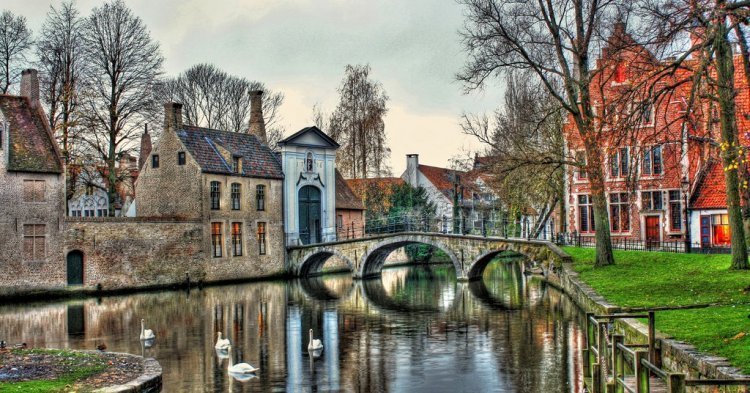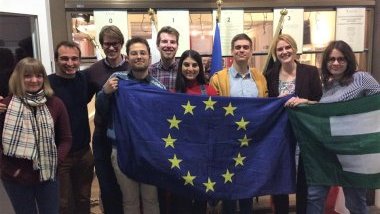Canals, picturesque houses and a medieval core which was granted UNESCO world heritage status in 2000 – that’s the main impression Bruges gives to its visitors, this town in the northwest of Belgium not far from the North Sea. Three to four million of them come each year to admire the city’s beauty.
The reason why it attracts young Europhiles is a different one, however: Bruges is home to the College of Europe, the cadre factory for the EU, an institution preparing the next generation for a European career. The second campus in Natolin (Warsaw) recently celebrated its 25th anniversary. Christopher Glück, president of JEF Europe, has studied there. We talked with him about the selection process, academic life and graduates’ perspectives.
Treffpunkt Europa (TPE): Why did you choose to apply for a master’s degree at the College of Europe?
Christopher Glück (CG): Decisive for choosing the College of Europe was that it is more than just a good university for European studies. In a time where even in political science normative approaches have become outdated, the College of Europe is almost anachronistic in its aspiration to empower its students to work towards a better Europe, an “ever closer Union”. For me, this aspect as well as the truly European life on campus, thanks to which I have learned more about Europe than in any seminar, were what really convinced me.
TPE: How did you experience the application process and the selection commission?
CG: I found the respectful treatment of applicants and the clear communication very pleasant. Important for me was also that the decision on full scholarships from which a majority of students profit was taken quite fast. The selection process is of course a little peculiar, especially the interview with the selection commission in three languages, yet an exciting experience. I was surprised that relatively few questions were asked about my motivation, it was rather about factual knowledge – somehow the commission nonetheless manages each year to select students who bring the right spirit for a socially intense year.
TPE: What did you enjoy the most, what did you like less?
CG: I spent one of the best years of my life at the College of Europe and I always enjoy wallowing in my memories, sometimes with melancholy though. The College of Europe manages better than other institutions to attract students who not only stand out academically but also have advocated or want to engage with political progress. The friends I made are still very dear to me. Adding to all this is the enriching cultural experience of living closely with people from more than 30 countries. And last but not least, it is of course also about a sometimes challenging and definitely interesting and multifaceted study programme with professors from various academic traditions. Unfortunately, not all courses were didactically up-to-date and I could not really warm up to some of the College’s hierarchical (some would say French) traditions. Though in the end, it did not really bother me much.
TPE: How have you benefited from your studies there?
CG: My outlook on Europe has definitely changed and it has probably become less of a German view of Europe. For me, especially the glimpse towards Eastern Europe was new, with a new world yet to be discovered. As political scientist, the insights into EU law and the European economy I gained during my studies in Natolin have certainly helped me to kick off professionally. And of course, it is great to have friends across all of Europe.
TPE: How did your career develop after graduation?
CG: One of the big advantages of the College is to get in contact with so many ideas and possibilities. Directly after the College, I started a position at the British finance ministry where I was negotiating EU dossiers on behalf of the British government. I myself would not have come up with that idea but a friend, British civil servant himself, had drawn my attention to the employment advert and briefed me for the application. In the wake of Brexit, I fled the island and started a position as assistant to a Member of the European Parliament.
And now, one of my dreams has come true when I’ve finally started a full-time position with JEF. After that, we’ll see – but I will certainly stay faithful to Europe. In this regard, I should probably also mention that the infamous “College mafia” is more of a myth. College graduates are usually just motivated and very open people rather than an elitist clique.
TPE: Finally, to whom would you recommend studying at the College of Europe?
CG: Those who enthuse over Europe, those who are hungry for new impressions and for an intense year – time-wise, socially and academically – are exactly in the right place and they will have a great year. Generally, I would not recommend the master programmes in preparation for a PhD, however, as they often do not allow for in-depth academic analysis of certain topics and are rather of practical nature.



Follow the comments: |
|
